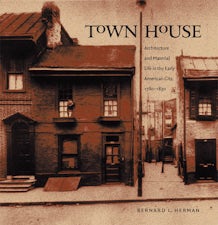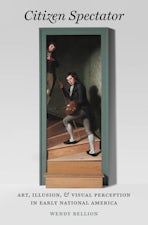The Power of Objects in Eighteenth-Century British America
By Jennifer Van Horn
456 pp., 6.125 x 9.25, 11 color plates., 130 halftones, notes, index
-
Paperback ISBN: 978-1-4696-5219-1
Published: February 2019 -
E-book EPUB ISBN: 978-1-4696-2957-5
Published: February 2017 -
E-book PDF ISBN: 979-8-8908-5063-8
Published: February 2017
Published by the Omohundro Institute of Early American History and Culture and the University of North Carolina Press
Buy this Book
- Paperback $45.00
- E-Book $29.99
For Professors:
Free E-Exam Copies
Published by the Omohundro Institute of Early American History and Culture and the University of North Carolina Press
Awards & distinctions
Finalist, 2018 George Washington Prize
Honorable Mention, 2018 Louis Gottschalk Prize, American Society for Eighteenth Century Studies
Moving beyond emulation and the desire for social status as the primary motivators for consumption, Van Horn shows that Anglo-Americans’ material choices were intimately bound up with their efforts to distance themselves from Native Americans and African Americans. She also traces women’s contested place in forging provincial culture. As encountered through a woman’s application of makeup at her dressing table or an amputee’s donning of a wooden leg after the Revolutionary War, material artifacts were far from passive markers of rank or political identification. They made Anglo-American society.
About the Author
Jennifer Van Horn is assistant professor of art history and history at the University of Delaware.
For more information about Jennifer Van Horn, visit
the
Author
Page.
Reviews
“Imaginatively developed, extensively documented, and well written. Recommended.”—Choice
“Forms a powerful testament to the value of true interdisciplinarity in its ability to advance histories of portraiture, decorative arts, and print culture as well as civil society, political identity, and gender and sexuality.”—William and Mary Quarterly
“Represents some of the best of material culture scholarship, blending new information and ideas that are stretched to thought-provoking but not always documentable observations.”—Panorama: Journal of the AHAA
“This is an exceptional example of the recent turn in material culture studies toward object assemblages.”—Journal of Southern History
“Van Horn’s work reveals how objects and people were integral to the networks that defined new individual and group identities within an emerging social order.”—Journal of Southern History
“Provides a convincing argument for the centrality of material culture studies to the ever-evolving American historical imagination. . . . Van Horn offers deft integration of material, visual, textual, emotional, and embodied evidence.”—Winterthur Portfolio




